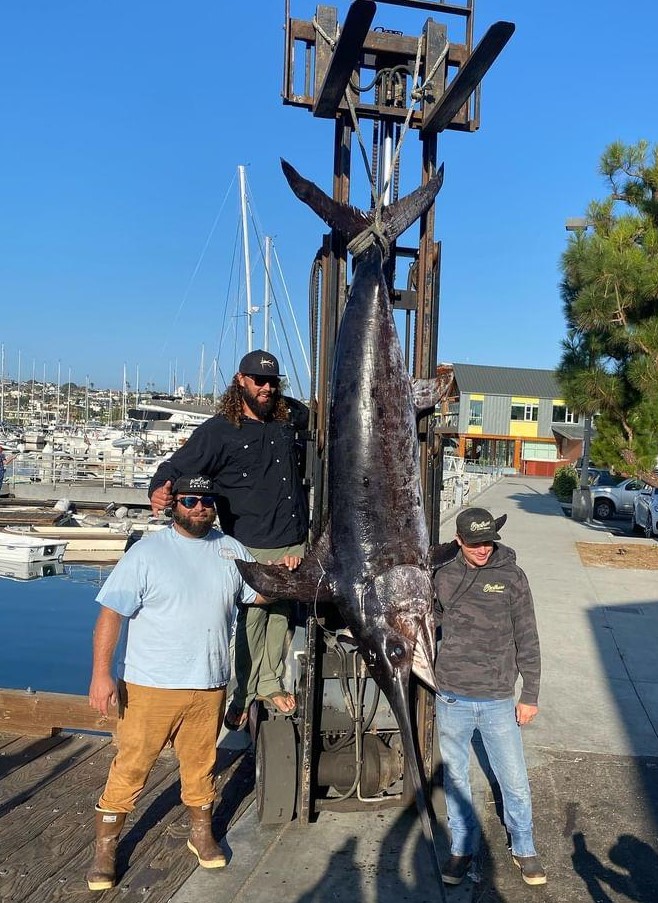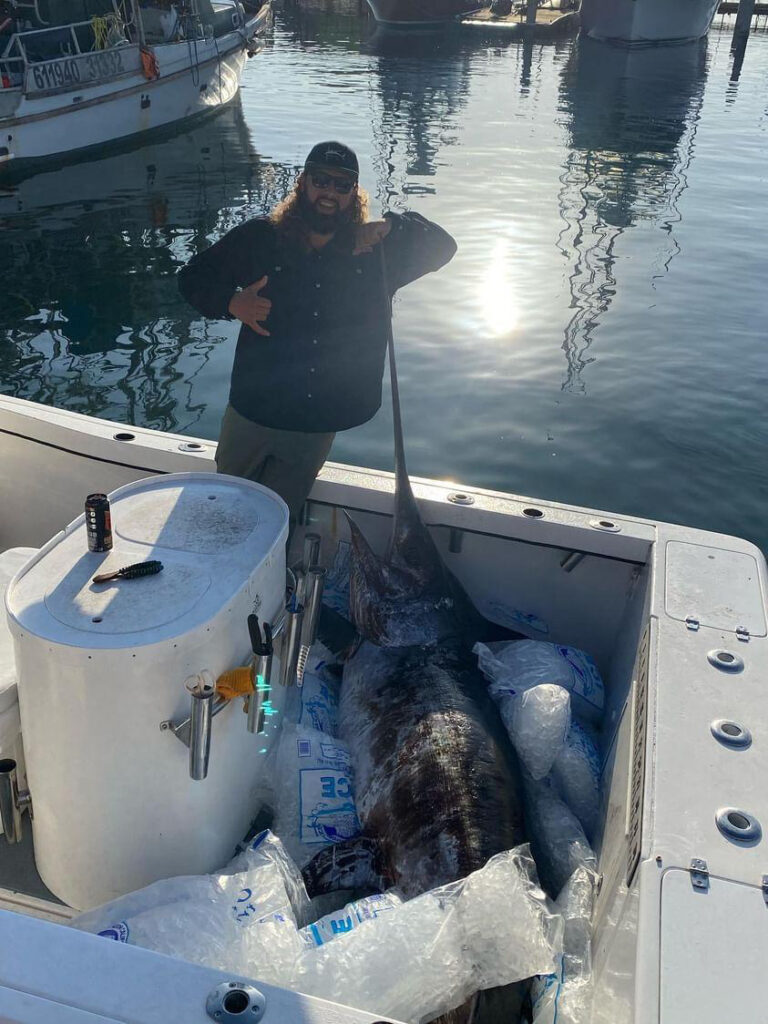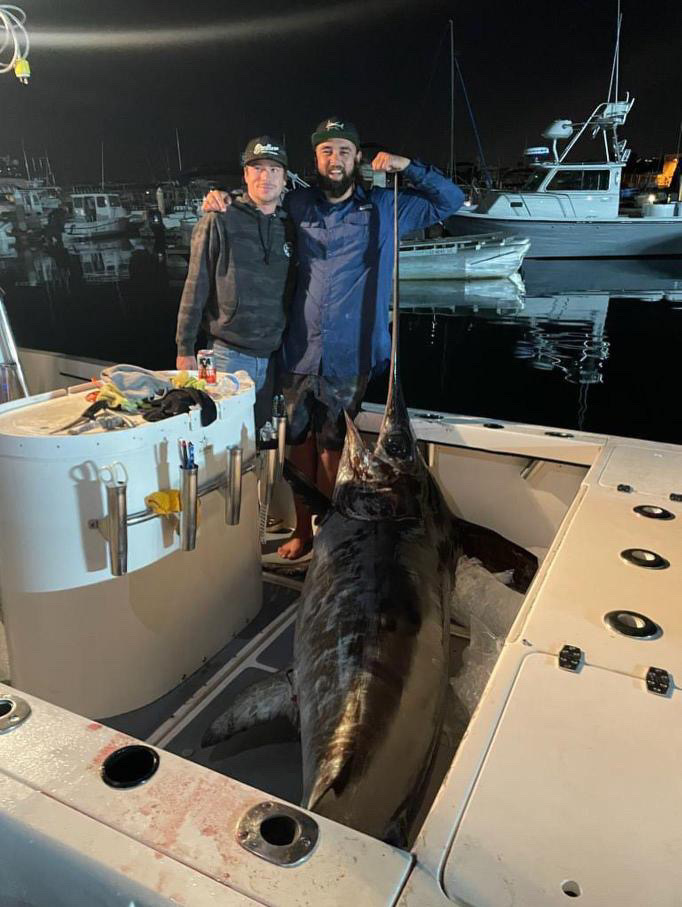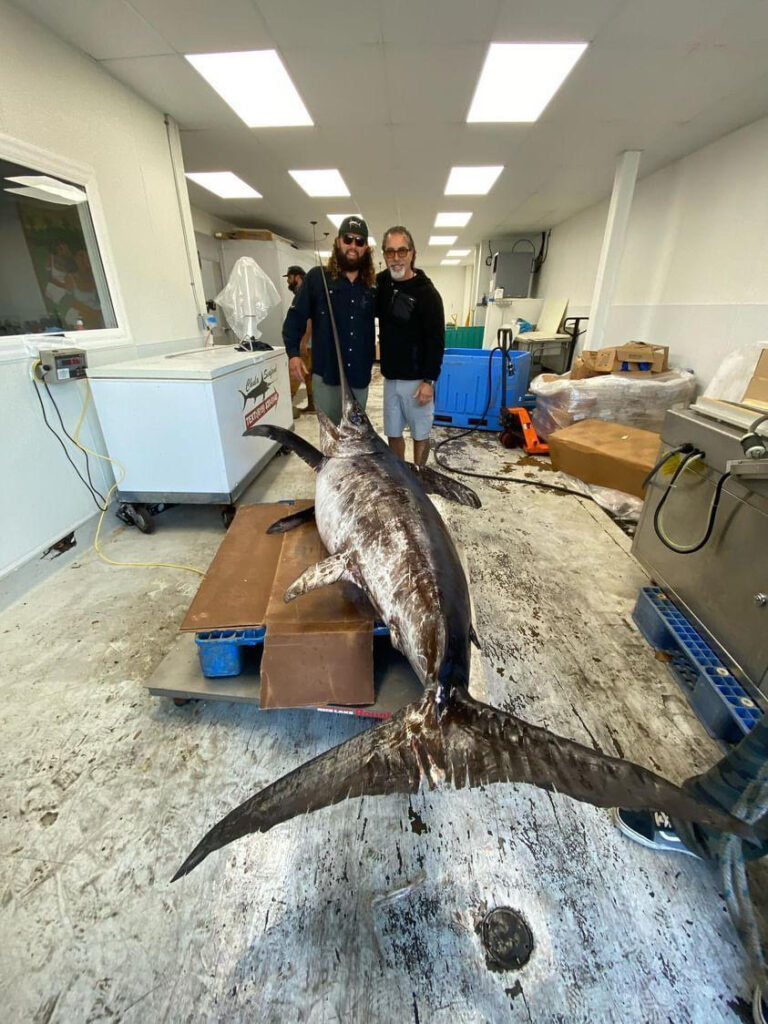
Updated Nov. 21: Western Outdoor News confirmed with Brothers Sportfishing that this fish was certified as a state record less than 24 hours after the story originally ran.
BY MERIT McCREA
SAN DIEGO — Besting the previous state record by roughly 80 pounds, the catch of a 520-pound swordfish off San Diego was the culmination of skill and a whole lot of lucky breaks. Capt. Ezekiel (Zeek) Cruz told the story.
Aboard the 4-pack charter boat that day, just before Halloween were himself, Mason Karafa on the rod and Dillon Houston, owner-operator of Brother Sportfishing, at the helm.
Running to the area before daylight, in the grey they’d already seen two swords flagging. As they got ready to set up their first drift they watched a good buddy Jay Saberon battling a big fish. He would get the fish, around 260 – 270 pounds.
They stuck around that area with several other boats fishing within a few-mile radius, all swordfishing friends practicing this relatively new-to-California deep-drop fishing style.

It was late in the day, with just a couple hours of daylight left, and nothing to show for it when Zeek and crew decided to make a Hail-Mary move to an area about 9 miles distant.
The rig consisted of a rigged squid on an 11/0 J-hook, a 5-foot chafing leader of 300-pound mono, 100-foot top-shot of 200-pound, 12-pound lead, all on a Hooker/Shimano Tiagra 50-wide filled with 80-pound Izorline braid.
In the new area, “the bait was down for less than 5 minutes when it got whacked,” said Zeek. Mason was the first to spot it and so he was on the rod, fighting the fish manually. With Dillon at the helm keeping the line at the right angle, Zeek managed all the deck gear, getting their 2 flying gaffs and tail rope ready, making sure drag tension was set properly, clearing disasters along the way which would prove both challenging and blessings in disguise.
The huge fish, which would ultimately measure out just a skosh over 10 feet long not counting its bill, came to color pretty quickly. “We got that sinker off within the first 5 minutes after coming tight,” said Zeek.
He said they played tug-o-war for 45 minutes right around that leader. They would get color from time to time, but really not enough to confirm it was actually a sword.
After they finally got eyes on it the thing came up to the surface and took a real long surface run, maybe 150 yards, did a U-turn and rushed the boat, faster than Dillon could wind.
It was charging the boat with half its body out of the water, just grey-hounding toward the boat.
Mason kept the tension on by driving the boat away from the fish.
When the beast gets to the stern it starts whacking the motor, attacking the boat. At that point Zeek takes a whack at it with the flying gaff in the whitewater. Hitting its bill solid, the fiberglass pole breaks and the hook drops out.
“He looped around and circled back, and came to attack us again,” said Cruz. Meanwhile he’d quickly untied the line from the first flying gaff and tied it on to the back-up flying gaff.
This time Zeek got him right in the shoulder with the flying gaff, and he dumped 500 feet of buoy line in like 30 seconds – just an absolutely blistering run on the surface, tore that line out of the basket and drug the buoy so fast across the surface it was trying to go under the water – “Like something out of Jaws.”
“We drove up on the fish because we could see it thrashing on the surface.” “We pulled up on the thing and it was on the surface, kind of just flayling, and it had wrapped itself in that buoy-line.”

Zeek said they could see the line had wrapped around its head, pinching its mouth and gills shut.
“You could see the color kind of change on hime, go from that like, blue-purple to brown.”
They pulled up on it and Mason’s yelling “It’s dying!”
They grabbed their last gaff and stuck it in the back of the head. Mason grabbed the buoy line and the huge fish rolled over and died right there.
They tied off the flying gaff rope, stuck the hook from the second flying gaff into it for good measure, tail-roped him, and at that point it was just about dark.
Now the three of then had to get the huge fish aboard. On the fifth heave they managed to get the fish’s head up on the railing. Zeek literally sat on the fish’s long bill to get it to tumble the rest of the way in.
They’d hooked the fish at 5:30 and had it aboard just before 7:00 PM.
“It was just incredible that we were able to catch that fish in such a short amount of time. If all the stars had not aligned, We’da lost that fish a dozen times,” said Cruz.
The three of them had plenty of experience battling and loosing swords in this game. The experience, coupled with a hefty dose of pure luck and good fortune all came together that evening.

At one point the line had gotten wrapped up in the motor briefly. At another all the blinker lights got jammed above the wax loop, so they had to quickly cut all the lights off and clear the wax loop so the line could be wound in.
Cruz said it was really a miracle they were able to get past all the things that went wrong along the way and very lucky for those that went incredibly right.
Later he would recount, given previous battles lost, it was very likely there were plenty of fish out there of that size, but it was just so unlikely to actually land one, it had never yet been done before.
Once they were back in the harbor it was all about finding a scale to weigh it with. They actually had no idea how big the fish actually was.
When they got to Dana Landing, They couldn’t get it off the deck without tying it’s bill to it’s tail it was so long, and they were maxing out the 500-pound scale before it was off the ground. It went to 499 and errored out.
They called all around to find a place with a scale that could weigh it. Chula at Driscoll’s was the only place that had a scale that went past 500 pounds.
The Marlin Club even told them they were afraid to attempt it because they thought it might break their davit.
A fish over 500 pounds on 80-pound Izor… Think about that.




